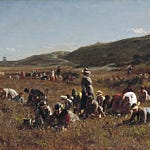“He’s all talk,” we say, when we want to criticize someone who says a lot but never backs it up with action. “Talk is cheap,” we say, when we want to remind someone that it’s one thing to say you will help, but another thing to do it. The Italian for chatter is ciarlare, from which they make the word ciarlatano, a chatterer, a man who talks a lo…
Substack is the home for great culture












